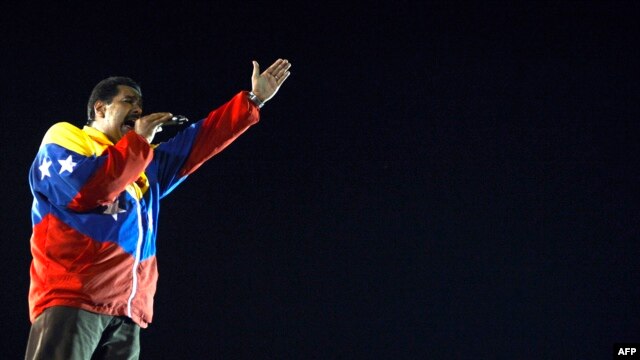Venezuelan voters pick successor to Chavez
| Publisher | Radio Free Europe/Radio Liberty |
| Publication Date | 14 April 2013 |
| Cite as | Radio Free Europe/Radio Liberty, Venezuelan voters pick successor to Chavez, 14 April 2013, available at: https://www.refworld.org/docid/519a6b722f.html [accessed 19 May 2023] |
| Disclaimer | This is not a UNHCR publication. UNHCR is not responsible for, nor does it necessarily endorse, its content. Any views expressed are solely those of the author or publisher and do not necessarily reflect those of UNHCR, the United Nations or its Member States. |
April 14, 2013
By RFE/RL
 Acting Venezuelan President Nicolas Maduro delivers a speech during his campaign in Maracaibo.
Acting Venezuelan President Nicolas Maduro delivers a speech during his campaign in Maracaibo.
Venezuelans are voting to elect a successor to President Hugo Chavez, who died in March after a two-year battle with cancer.
His chosen successor, acting President Nicolas Maduro, is favored to win, but recent polls show that challenger Henrique Capriles has narrowed Maduro's advantage.
Maduro is promising to push forward what Chavez called "21st-century socialism, " a mix of hard-left politics, heavy government spending on the poor, and state control over the economy.
Capriles has been campaigning against a government that has faced chronic food shortages, inflation, power outages, and surging crime.
At stake is control of arguably the world's largest oil reserves and economic aid to a host of left-leaning governments in Latin America.
Chavez beat Capriles with 55 percent of the vote in October's presidential elections, but his condition worsened and he was never formally inaugurated for his new six-year term. He died at a Caracas hospital on March 5.
Chavez led the South American state for 14 years.
Glorifying Chavez
The election campaign lasted less than two weeks. Maduro, Chavez's 50-year-old longtime foreign minister, highlighted his ties to the late president.
On April 13, he urged his supporters to vote in the election.
"Now it's the people's turn to decide. What they, the people, decide is sacred. We will respect and defend what the people decide. We won't be saying what if I half-won or half-lost, I'll evaluate later: no. I won't evaluate anything. The only evaluation is the one that you, the people of Venezuela, make. You are sovereign," Maduro said.
Capriles, the 40-year-old governor of Miranda, Venezuela's most populous state, spoke of uniting the divided country and fighting corruption.
On April 13, he called for transparency.
"We hope the arbitrator fulfills his duties tomorrow, the National Electoral Council fulfills its role. The National Electoral Council can't be a political party. Tomorrow it must be the arbitrator. From here, we call on the rectors of the National Electoral Council. The country wants to express itself in complete liberty tomorrow. May the arbitrator be impartial so that, at the end of the journey, there is no doubt about the results. That's the key. For me, whatever the people decide tomorrow is sacred," Capriles said.
On April 13, state television showed Maduro visiting Chavez's grave to mark Chavez's return to power after a brief coup in 2002. He was accompanied by Argentinian football star Diego Maradona, who also took part in Maduro's final election rally on April 11.
State television also broadcast a series of programs glorifying Chavez.
The opposition lodged an official complaint with the election commission. It said state TV violated a ban on formal campaigning in the final two days before the vote by broadcasting "biased political content."
The winner of the election is due to be sworn in on April 19.
With reporting by AP and Reuters
Link to original story on RFE/RL website
